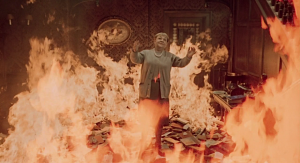When a local motorcycle and skidoo shop adopted the name “Toys for Big Boys” I would have thought it would mean death for their business. I would have guessed that the  overgrown baby that is the man who loves to play with trucks and all-terrain vehicles would have felt called out, insulted by this attack on his maturity. I was wrong.
overgrown baby that is the man who loves to play with trucks and all-terrain vehicles would have felt called out, insulted by this attack on his maturity. I was wrong.
Instead, those same men embraced the descriptor, happily trundling off to the store to buy ever more costly items, all the while 
 comfortable with the term, and apparently the idea, that they were immature manboys who were playing while others were working.
comfortable with the term, and apparently the idea, that they were immature manboys who were playing while others were working.
For me, that did not so much explain those men as it forced them into the open, like overturning a rock and being surprised by the insects blinking in the sun. I knew the type, and I have always had several friends who enjoyed playing even though as they grew older that became less defensible, at least for me. I never really understood either part of the phenomena. I don’t know why a man feels the urge to get in a buggy to drive too fast over a hill, or use a front end loader to spin their equally immature manboy friends around in circles, or shoot big guns, or run  remote toy cars around the neighbourhood, or tear through the woods on ATVs, or drive monster trucks—the list is as infinite as the toy store can supply.
remote toy cars around the neighbourhood, or tear through the woods on ATVs, or drive monster trucks—the list is as infinite as the toy store can supply.
Many times there are children  at home that would love to play as well, but for many of these men, that is women’s business: the playing with children, while the playing with other men, that is for real men? Some will use the children as a rationale for the purchase of the toy, and others will include the child in their childish play, but for most of them, their play is meant to please their own childish minds and no one else. Not surprisingly, narcissism is a big part of the driving force for the manboy. He wants to remain a child, in that he doesn’t want to feel responsible for anybody or to anything, and just wants to play in the sun all day. He is not worried that his play must be
at home that would love to play as well, but for many of these men, that is women’s business: the playing with children, while the playing with other men, that is for real men? Some will use the children as a rationale for the purchase of the toy, and others will include the child in their childish play, but for most of them, their play is meant to please their own childish minds and no one else. Not surprisingly, narcissism is a big part of the driving force for the manboy. He wants to remain a child, in that he doesn’t want to feel responsible for anybody or to anything, and just wants to play in the sun all day. He is not worried that his play must be  compensated for by someone else, by the wife who takes care of the kids, or has extra work to do when he comes home dirty, or that the children are losing part of the household income. Instead, like a child, he throws petulant fits if he can’t play with his toys, or if someone else wants to share them.
compensated for by someone else, by the wife who takes care of the kids, or has extra work to do when he comes home dirty, or that the children are losing part of the household income. Instead, like a child, he throws petulant fits if he can’t play with his toys, or if someone else wants to share them.
The other part of the phenomena is equally peculiar. The manboy has no shame that he wants to play like a child. In fact, he is proud that he only thinks of entertaining himself playing with toys. Oddly, he can often be induced to violence  if you threaten his manhood by suggesting that he would be better to take some responsibility for his own life, the lives of his family, and his society, than tearing through a bog with a huge truck. He feels—and this is related to his narcissism—that he has every right to squander the household income on expensive toys for himself, that he has every right to play with his other manboy friends on the weekend instead of using that time to spend with his wife or children, or, god forbid, doing
if you threaten his manhood by suggesting that he would be better to take some responsibility for his own life, the lives of his family, and his society, than tearing through a bog with a huge truck. He feels—and this is related to his narcissism—that he has every right to squander the household income on expensive toys for himself, that he has every right to play with his other manboy friends on the weekend instead of using that time to spend with his wife or children, or, god forbid, doing  something more productive that might benefit society or others.
something more productive that might benefit society or others.
This shame cannot even be induced artificially. If you suggest to the manboy that he should spend less of the household money on himself, or that the toys bought should be those that a child would enjoy as well, he becomes defensive and outraged. He feels he has a right, by virtue of working all week, to not have to work on the weekend. This is a perfectly legitimate feeling, and I think we all share it, but he neglects to consider who else cannot play because he is playing. If he leaves his children behind so he can play cars with his  buddies, or swing from ropes with his friends, then someone else has to work more in order to allow that. His playtime is only for himself and he doesn’t understand why that’s a problem. That lack of understanding, or the will to misunderstand, is the principal problem.
buddies, or swing from ropes with his friends, then someone else has to work more in order to allow that. His playtime is only for himself and he doesn’t understand why that’s a problem. That lack of understanding, or the will to misunderstand, is the principal problem.
Some manboys cut right to the chase and insist on spending their leisure time in diapers pretending to be a baby. Although this reads like a psychological problem of some sort to broader society, and to the psychologist, to the manbaby himself this relieves him of responsibilities just as he relieves himself in his drawers. He is allowed, in the privacy of his own home, to coo and drool and throw temper tantrums, and although this attitude spelled out in physical form might look especially unappealing, it will also seem strangely familiar to those who have dealt with the manboy who likes to play instead of work. Of course, the manbaby, like the manboy playing with toys, is not content to have this be a private affair, and usually will try to involve others with his play. He will sometimes hire others—it’s almost always adult women who bear the responsibility for the manboys—to care for him while he pretends to be a baby. He asks her to tolerate his tantrums, feed him milk from a bottle and, if he pays her enough, perhaps even change him. He never pauses to consider what he is asking of another, or to consider her feelings, but instead thinks that his feelings, his wishes, and desires are more important than another’s.
Behind all of this playtime for adult babies is the larger question of what a person should be doing with their life. If, as the leisure lifestyle advertisements argue, we should be filling our spare time tending to our own amusement, then the manboy is on the right track. If not, and we should be tending to the responsibilities of our own life, our family, our community, and more broadly the world around us, then the manboy is a frivolous, selfish twit.
filling our spare time tending to our own amusement, then the manboy is on the right track. If not, and we should be tending to the responsibilities of our own life, our family, our community, and more broadly the world around us, then the manboy is a frivolous, selfish twit.
In Ray Bradbury’s Fahrenheit 451 he has his protagonist Montag ask his wife if the world is starving while they play: “Is it because we’re having so much fun at home we’ve forgotten the world? Is it because we’re so rich and the rest of the world’s so poor and we just don’t care if they are? I’ve heard rumours; the world is starving, but we’re well-fed. Is it true, the world works hard and we play? Is that why we’re hated so much?”
When I taught Fahrenheit 451 right after the spring break and many of my students had spent their break skiing down hills or lying on tropical beaches being served by the poor.  Because of the contrast Bradbury is asking us to imagine, that line struck me with a force I’d never before noticed. We know that people are suffering in the world. Is Montag’s moral condemnation true? That we are playing while they are starving? Do we have so little notion of our responsibilities that we think it is fine that we bungee jump our way to debt and negligence on someone else’s dime?
Because of the contrast Bradbury is asking us to imagine, that line struck me with a force I’d never before noticed. We know that people are suffering in the world. Is Montag’s moral condemnation true? That we are playing while they are starving? Do we have so little notion of our responsibilities that we think it is fine that we bungee jump our way to debt and negligence on someone else’s dime?
According to the many men in our society who feel entirely justified entering the Toys for Big Boys shop to spend a third of their household income in order to fitter away their time and most useful years, the answer is yes. And their actions bear out their statements. They do not care about anyone else in the world or what a person should spend their time doing. It never occurs to them that there are other ways of being, in which they occupy themselves tutoring their children so that they become stronger students, join with their friends to build a house for a family in need, visit their aging parents, take out the trash and fix the garage door, or in some way make a contribution to society. As far as the manboys are concerned, their play alone justifies their existence, and that attitude, even more than their manplay, shows their lack of maturity.
in which they occupy themselves tutoring their children so that they become stronger students, join with their friends to build a house for a family in need, visit their aging parents, take out the trash and fix the garage door, or in some way make a contribution to society. As far as the manboys are concerned, their play alone justifies their existence, and that attitude, even more than their manplay, shows their lack of maturity.

